'On a visit to the British Museum, while sitting on the steps of an interior staircase, the rapper Angel Haze makes a startling revelation. She tells me how her father died. "He was shot in the stomach," says the 22-year-old American. Haze's slender arms, poking from a loose shirt, clutch her legs. A Versace pendant hangs low, to the waist, as does her parted black hair, coloured a kind of blue at the tips. "He shot himself. Trying to pistol-whip someone in a fight."
It's a disclosure so sudden, so wildly out of keeping with our environment – museum browsers, school kids, Benugo outposts – that I have to stifle a laugh. Haze does, too. The instinct is inappropriate and I'll shiver to recall it later; but perhaps it's understandable. Parts of Angel Haze's story are appalling and the mind wants to compensate, make light. She often does, revealing that detail about her father's death as if it were a punchline, or chuckling discordantly while telling me about her toxic relationship with her mother.
Raised in poor, sapped Detroit and now a resident of prospering New York, Angel Haze produces hip hop that's remarkable for its crunching collision of tones. Lyrics express sorrow as often as swank, vulnerability admitted a rhyme away from concrete nerve. Meeting Haze in person there are comparable jolts and switches to contend with. She is someone who can talk with lacerating frankness about childhood trauma and within minutes be giddily describing her crush on a fictional character from a computer game. Cheeking museum guards, then saying: "I'm fun, right? I'm fun."
She's fun, she's troubled, she's a puzzle. I'd suggested we meet at the museum for fairly leaden reasons. Haze's new album (a follow-up to 2012's reputation-establishing Reservation) is titled Dirty Gold. And casting about for somewhere to take her while she visited London I'd noticed the British Museum had on an exhibition about gold… No doubt I'd imagined a clever parallel could be drawn in my article. In fact, shortly after meeting Haze, the choice of location seems wrong. Too frivolous. On the steps, surrounded by the happy clatter of lunching kids, Haze tells me: "I won't ever go back to Detroit. I won't step foot in that city. I don't know if I need to go back, for some sort of redemption, but I can't bring myself to. I'm terrified – I feel like inside me a very, very young girl is still trapped there, scared to fucking death."
This article includes content provided by Spotify. We ask for your permission before anything is loaded, as they may be using cookies and other technologies. To view this content, click 'Allow and continue'.
Long before she merged her middle name with the sobriquet of a porn star to become Angel Haze, Haze was Raeen Angel Wilson, born in Detroit in 1991. Her father, an African American, was mixed up in what Haze now calls "very ratchet shit" – gangs. He died when Haze's mother, a native American Cherokee, was pregnant with her. "I don't acknowledge my father as anything in my life," Haze says.
When Haze was still very young, her mother "met this guy. He told her, 'God wants you to drop out of college.'" The man was a preacher in the Greater Apostolic Faith, a cult-ish religion with the standard structures in place to ensure that the man in the middle of it all got to behave outrageously. In this case the preacher was already married with kids. But God, he said, wanted the Wilsons to move into his home, with the vague idea that he would one day take on a new wife. Haze's mother, "in a state of severe vulnerability", went along with it.
Life with this preacher was a mix of the abusive and the mundane. Haze remembers being told that she would die, spontaneously, if she didn't behave correctly. There were interminable church gatherings. She had happier times, though, with the preacher's children. They liked to play a trivia game on the computer and Haze was fought over: everyone wanted her on their team because she was extremely intelligent.
"At school I was one of those kids who wanted to know more than anyone. The second you don't know more than people, they have the ability to manipulate you. I suppose my entire life has been built around my desire not to be manipulated. Not to go back to where to where I came from.'
By the time she was 14, her mother had left the religion and the family were living in Virginia. Haze was beginning to write – first poems and, later, raps. She made some rough-spun hip hop on a computer and distributed it online, where a small fanbase formed. On her newest album Haze recalls discovering rap as an outlet:
"I was nothing
Then all of a sudden I'm a volcanic eruption."
Her first manager, a New York impresario called Le'Roy Benros, approached Haze by email. Together they spent hard months tightening her material and planning how best to launch her career. In interviews Benros has described this period as one of "tough love… I spent a whole year telling Angel that she wasn't ready, that the songs weren't good enough." The 14-track Reservation was put online for free in summer 2012 and its lead track, "New York", became a viral hit. Haze was quickly signed by Universal Records in the US and Island Records in the UK.
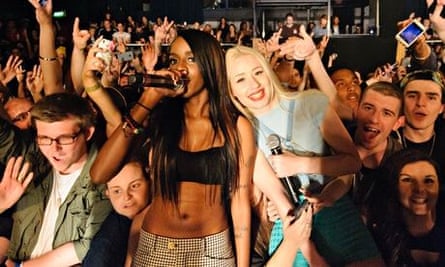
A year of "tough love" had undoubtedly strengthened the music: critics adored Reservation. On a personal level, however, Haze had endured more than her share of tough love already. She tells me now: "I have a hard exterior, I seem to be desensitised, but I do have emotion." According to Haze, she sacked Benros in early 2013 after an argument over a music video. Haze, who now has a new manager, believes their problems ran deeper. "He treated me like I was a boy. And I'm all for the ambiguity. But I'm still fragile, at the end of the day. If you know me in the ways he claimed to know me, you know I break" – she clicks – "like that. I feel like I give people an entire blueprint into who I am. And what they choose to do with that blueprint is their choice."
The blueprint is her music. As a rule, Haze puts everything in. Grudges. Traumas. Incongruous references, from Casper the Friendly Ghost to self-harming. She brags, plenty, though not without wit. (How about this for a lyric? At once a hard nut of economic writing and pure, playground silliness: "I been the shit since shit been poo.") Haze's mother gets mentioned a lot.
"My mom knew, when I said I wanted to make this my life, that I was going to tell everything. Because if I lie, then what does that make my story?" In early tracks Haze hinted at a specific ordeal in her youth. ("It's hard to cope with a kiss that you can't tell/And a word that you can't spell.") Then, in a track released in late 2012, a reworking of Eminem's "Cleanin' Out My Closet", she was more explicit, telling how she'd been raped as a child: "Imagine being seven and seeing cum in your underwear."
Her attacker was a man close to the family, and "It happened in a home where everyone fucking knew", as Haze raps on the track. This home, she tells me , was the one in Detroit they shared with the preacher. He wasn't the attacker. That was a man called Daniel, Haze says, linked to the family because he had fathered a child with one of her mother's cousins. I ask Haze whether she has ever discussed this with her mother. Often, says Haze. Recently: "My mom sat in the kitchen and told me, 'I'm sorry that you were touched.'"
Haze pauses, glaring with an eyebrow arched. "Touched? Really? Is that how you're going to sum it up? My mom was fully aware of how bad I had it." Has she ever thought of pressing charges? Haze says she raised the idea, once. "And my mom told me the only thing I could do was forgive him. Because by then my little brother was living in our house."
This was a complicated development. The young son of her attacker had been more or less abandoned. Haze's mother took him in and he came to be thought of within the family as Haze's sibling. Another impossible contradiction in Haze's life – this blameless and cheerful kid a constant reminder of the man who had assaulted her. "That first year I had a really hard time connecting with my little brother," she says. "He looked so much like the guy who raped me."
We've been crouched on the museum's marble steps for almost an hour and a security guard has been hovering. Finally we're told we have to move on, which I can see makes Haze bristle. We decide to look in on that exhibition about gold after all. "This is cool," she says, admiring a breastplate from ancient Colombia. A museum attendant won't allow any photographs. "Bitch," mutters Haze.
Walking around the displays, Haze reminisces about school, where a kind teacher took an interest in her, and noted: "You don't do really well with direction, do you?" It's something she still wrestles with. Last December, frustrated with her label's release plans for Dirty Gold, Haze leaked some tracks from it online. Peeved, her label bosses brought the release forward to the week after Christmas – not a good time of year to sell an album. "I knew what to expect," says Haze of Dirty Gold's poor initial sales. She's confident that the quality of the record, "a great piece of artwork", will tell eventually.
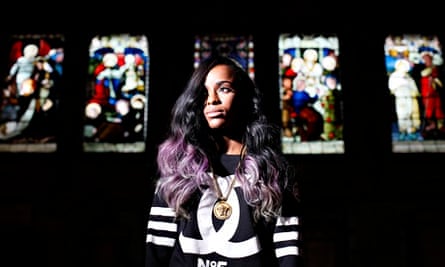
She has decided that being blunt – about what she wants, and what she's been through – is therapeutic. "Two years ago it was very difficult to be in the same room as me. You could feel everything, all the trauma, weighing me down. Through music I've let go. Projectile-vomited my demons all over the place."
Being in love has helped, too. Haze is two years deep into an on-off affair with somebody "huge in the fashion world", who she first met online. Somewhere out there, she admits, a horribly public first chat-up line is still available to view on Twitter… "I think it's a for-life thing," says Haze, contorting her sentences to avoid using a gender pronoun while discussing this because "I'm so not about categorising things".
It was on a track released last summer that Haze made plain her feelings on the fluidity of sexual attraction:
"No I'm not gay
No I'm not straight
And I sure as hell am not bisexual
Damn it I am whoever I am when I am it"
Before that, on "Cleaning Out My Closet", she wondered whether the experience of being raped had influenced her in this regard:
"I was extremely scared of men
So I started liking girls."
Gay, straight – whoever she is when she is it – Haze tells me she's "probably the worst person in the world to be in a relationship with". The Detroit years have left their legacy. "If you spend time with me, you're choosing to enter the lion's den. I'm gonna be extremely cuddly at times. And at other times I'm gonna want to bite your fucking head off."
The staff of the British Museum have absorbed Haze's lion-like tendencies today. As we leave the gold exhibition she's in cuddly mode, chatting about a self-help book she's been writing in her spare time. She promises to send me some chapters and when I ask if she has a title yet, Haze answers dryly, half-smiling, teasing I think. "Get The Fuck Over Yourself," she says.
Dirty Gold is out now on Island Records/ Republic Records. The new single "Battle Cry", featuring Sia, is out on 17 March
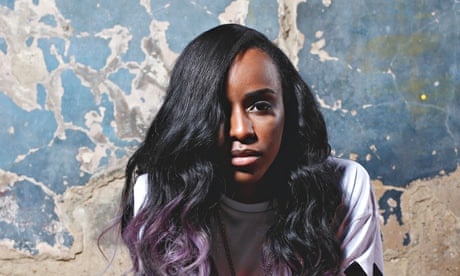
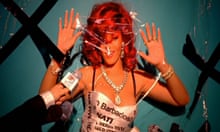

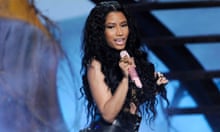
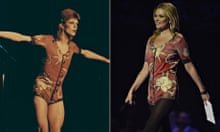

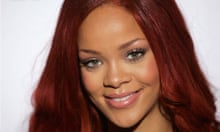
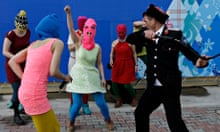
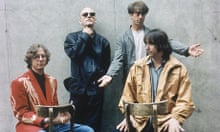
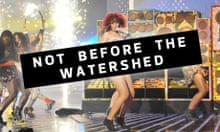

Comments (…)
Sign in or create your Guardian account to join the discussion